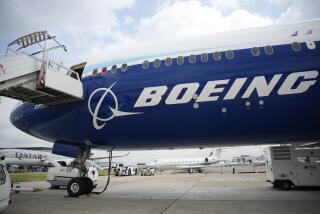Ducommun Posts Loss of $5.8 Million for Quarter
- Share via
Ducommun, a Los Angeles-based aerospace firm, Thursday posted a $5.8-million third-quarter loss resulting from a series of operational problems uncovered by new management that was installed by the board last July.
The sizable loss at the firm, which was established in 1849 and promotes itself as the “oldest continuing business in California,” came on sales of $16.3 million, compared to a $1.8 million loss on sales of $17.5 million in the same period last year, the company said.
“The company is in a turnaround situation,” said D. R. Schort, Ducommun’s chief financial officer. “We feel the worst is over.”
Norman Barkeley, former chief executive of Lear Siegler, was named president and chief executive by the Ducommun board last July, replacing former Chief Executive Wallace Booth. However, Booth remains chairman. Five of the eight directors are not members of the company’s management and three of the outsiders are members of the Ducommun family, which controls 15% of company shares.
Schort said the company has tried to reduce costs by eliminating excess management and administrative employees, resulting in a 15% work force cutback in the last six months. The company now has about 1,000 employees, down from about 1,175.
$900,000 Charge
The 1988 loss included a $1.7-million charge against profits for projected losses that will occur on an undisclosed number of fixed-price aerospace subcontracts that have experienced overruns, Schort said.
“There has been a change in operating management at Ducommun since July,” Schort said in a telephone interview. “We did a review, and we found that there were some unexpected cost overruns.”
The bulk of the overruns occurred on a six subcontracts for metal-forming work on aircraft parts, Schort said. He declined to identify the contracts because the company is attempting to renegotiate the agreements with the intent of recovering some of its losses.
Also, a $900,000 charge was taken against earnings for excess capital equipment, principally drill presses, milling machines and computing equipment, Schort said. The equipment was being carried on the Ducommun ledger at its depreciated value, but that was still higher than the salvage realized when the equipment was sold, Schort said.
A $1-million reserve was established for “slow-moving inventory,” which, Schort explained, was commercial and military work in process that was begun without a sales order. Such production is not normally done in the aerospace industry, suggesting that controls at the company may have been loose. Schort said management believes that the products will not find a buyer.
Another reserve of $600,000 was set aside on two legal claims pressed by Ducommun. After the Challenger space shuttle disaster, Ducommun had to suspend work on parts it produces for the shuttle’s external fuel tank. Ducommun pressed a claim to recover its costs resulting from the work stoppage and eventually received $8 million, but that still left the firm with a loss of $600,000.
In addition to the reserves, Ducommun said its sales declined due to delays on completing aerospace tooling contracts and in getting production started at a new wire cable manufacturing facility. For the first nine months of this year, sales were down 8.2%.
“The cost-reduction programs and management changes at the operating units are expected to result in annualized cost savings of more than $3 million and should allow the company to begin capitalizing on the strong commercial aerospace market and the resumption of production for the space shuttle program,” Barkeley said in a statement.
More to Read
Inside the business of entertainment
The Wide Shot brings you news, analysis and insights on everything from streaming wars to production — and what it all means for the future.
You may occasionally receive promotional content from the Los Angeles Times.











